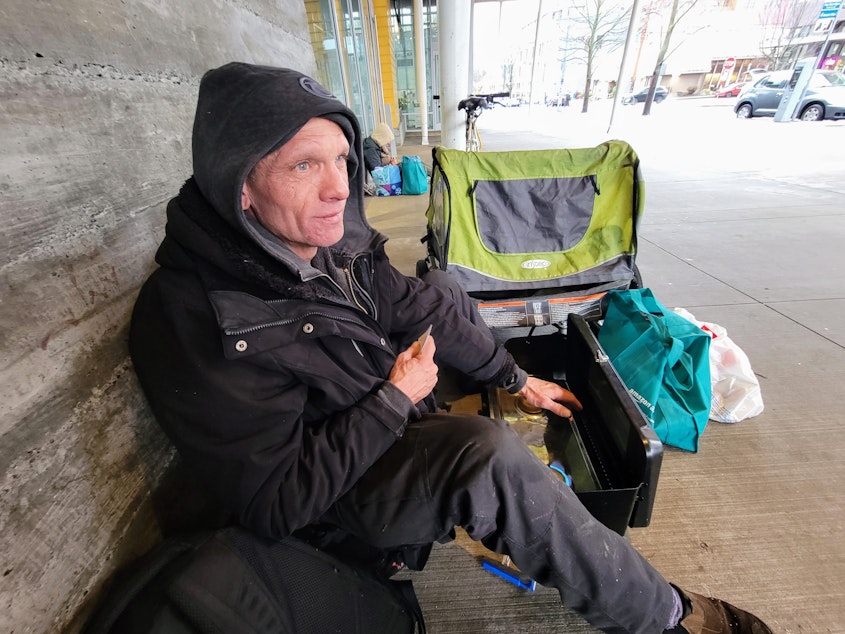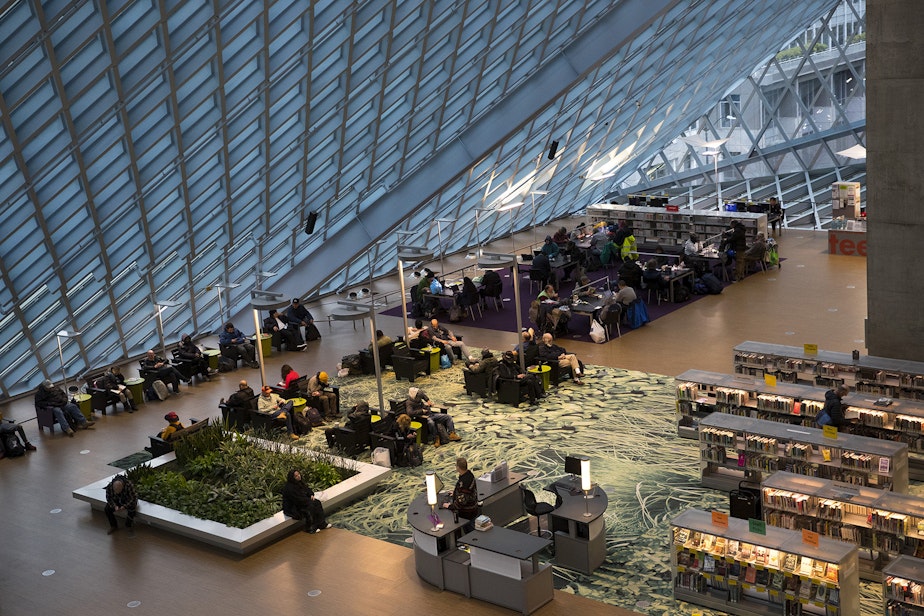Libraries in Western Washington confront the challenges of being open to all

Libraries have long been community spaces that are welcoming to all, a so-called “third place” (after home and work) where people can gather, stay warm, read books, and relax.
But that open-door policy means that libraries and the people who work there often deal with larger social issues that they are not trained to handle, such as mental illness, homelessness, and substance abuse.
“Our library staff are amazing at delivering excellent library service, but they are not social workers,” said Bellingham Public Library Director Rebecca Judd. “We have often felt like we were dog paddling in deep water, out of our depth.”
To combat this challenge, Whatcom County Health and Community Services contracted with a social service agency in Bellingham to embed two behavioral health professionals at the downtown branch of the Bellingham Public Library. The two, known as the Library HEART Specialists, split time at the branch so one is available every hour the library is open. Other libraries across the country are taking similar actions.

More than 200 libraries in the U.S. have either hired a mental health professional or trained their staff to deal with patrons who are in distress or experiencing a mental health crisis.
RELATED: I was a 'library kid.' But my old school is among many in WA that no longer have librarians
Over the last two years, the Seattle Public Library has created an in-house social services team that includes a social services librarian, a senior community resource specialist, and a second trained social worker who helps young people up to the age of 26. The program is funded by a 2019 levy, the city's general fund, as well as library-generated revenue.
Sponsored
“This team provides expertise to the library on social service resources, coordinates with other providers, works closely with our security team to support staff in de-escalation and trauma-informed practices, and assists patrons in need of referrals or who are in crisis,” explained Elisa Murray, digital communications specialist with the Seattle Public Library.

In 2023, the social services team provided 934 referrals and support to library patrons for housing, food, clothing, mental health, and other services, according to Murray. The Central Library also held 14 gatherings focused on social services called "Coffee and Conversations" that were attended by more than 400 people.
Murray also said all Seattle Library staff receive training to assist and support library patrons who are experiencing mental health crises.
For a smaller library like the downtown Bellingham branch, Judd said it made more sense to contract with an outside group to provide those services and let their staff librarians focus on their other duties, like helping people find books and access other resources.
RELATED: Homelessness 'is no longer just Seattle’s problem'
The Bellingham Public Library received funding to hire the mental health professional from the City of Bellingham and Whatcom County.
Malora Christensen, the response systems manager for Whatcom County Health and Community Services, said the choice to embed health professionals within a team has proven effective for other county and city departments, including law enforcement, the Whatcom Dispatch Center, and the legal system.
Sponsored
“This is another example of saying let's take a skilled professional who has a certain expertise and embed them in a setting where there is a need,” Christensen said. “It really does the job of bridging some of the silos that can happen between, maybe, crisis services and a service like the library or shelters.”
Christensen said it's important to meet people where they are, and where many unhoused people are during the day, is their local library.
RELATED: Local libraries lead the pack in digital reading
“People need a place to be, and they need to feel safe,” she said. “And when they feel welcomed and supported, they're also more able to engage in those services that might help them change that trajectory of their situation.”
Judd said the addition of a mental health professional to the library team in Bellingham is a way to ensure that everyone who walks through the library doors is treated with respect.
Sponsored
“Our behavioral health specialist might come up and just have a quiet moment with that person and see if they can connect with them. 'How's your day going?' 'Is there any support that you need today?'” she said. “Just a smile and a warm hello goes a long way in our in our public space.”
As for other public spaces dealing with escalating crises of mental health, homelessness, and substance abuse, Christensen said more barriers need to be removed, so people can more easily access resources and get the help they need.
“So many of our systems of care have barriers to even walking in the door. Systemwide, statewide, that’s the infrastructure that has to be built,” she said. “I know that’s a heavy lift, but there’s really, in my opinion, no other way.”
EDITOR'S NOTE: This story was updated on Tuesday, March 12, to include a photo of the behavioral health specialists hired by Bellingham Public Library, more accurately describe the addition of those specialists at the Bellingham downtown library, and to add a more detailed account of the social services provided by the Seattle Public Library.



